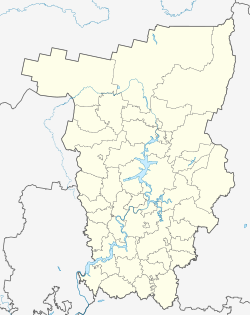Nytva
Nytva
Нытва | |
|---|---|
| Coordinates: 57°57′N 55°20′E / 57.950°N 55.333°E | |
| Country | Russia |
| Federal subject | Perm Krai[1] |
| Administrative district | Nytvensky District[1] |
| First mentioned | 1623 |
| Town status since | 1942 |
| Elevation | 120 m (390 ft) |
| Population | |
• Total | 19,041 |
| • Capital of | Nytvensky District[1] |
| • Municipal district | Nytvensky Municipal District[3] |
| • Urban settlement | Nytvenskoye Urban Settlement[3] |
| • Capital of | Nytvensky Municipal District,[3] Nytvenskoye Urban Settlement[3] |
| Time zone | UTC+5 (MSK+2 |
| Postal code(s)[5] | 617000, 617001 |
| OKTMO ID | 57727000001 |
| Website | gorodnytva |
Nytva (Russian: Ны́тва) is a town and the administrative center of Nytvensky District in Perm Krai, Russia, located on the Nytva River near its confluence with the Kama, 70 kilometers (43 mi) west of Perm, the administrative center of the krai. Population: 19,041 (2010 Census);[2] 20,660 (2002 Census);[6] 21,861 (1989 Soviet census).[7]
Etymology
[edit]"Nytva" can mean green water in the Komi-Permyak language and silt water in the Mansi language.[citation needed]
History
[edit]The village of Nytva was first mentioned in 1623.[8]
In 1756 the Nytvensky copper smelting plant was built. Its founder is considered to be Maria Stroganova. By the end of the 1780s, the factory had become an ironworks and rolling mill. A quay and shipyard were built on the river. At the factory anchors and hammers were produced.
In 1913 railway was laid.[8]
In 1928 Nytva gained a status of worker settlement. The status of city was obtained on June 19, 1942.[8]
Administrative and municipal status
[edit]Within the framework of administrative divisions, Nytva serves as the administrative center of Nytvensky District, to which it is directly subordinated.[1] As a municipal division, the town of Nytvensky, together with eight rural localities, is incorporated within Nytvensky Municipal District as Nytvenskoye Urban Settlement.[3]
Culture
[edit]The Nytva Museum of Local History was established in 1958. One of its most interesting exhibitions is the Spoon Museum, whose collection includes over 1,700 various spoon items from fifty-seven countries.
References
[edit]Notes
[edit]- ^ a b c d e Law #416-67
- ^ a b Russian Federal State Statistics Service (2011). Всероссийская перепись населения 2010 года. Том 1 [2010 All-Russian Population Census, vol. 1]. Всероссийская перепись населения 2010 года [2010 All-Russia Population Census] (in Russian). Federal State Statistics Service.
- ^ a b c d e Law #1738-356
- ^ "Об исчислении времени". Официальный интернет-портал правовой информации (in Russian). June 3, 2011. Retrieved January 19, 2019.
- ^ Почта России. Информационно-вычислительный центр ОАСУ РПО. (Russian Post). Поиск объектов почтовой связи (Postal Objects Search) (in Russian)
- ^ Federal State Statistics Service (May 21, 2004). Численность населения России, субъектов Российской Федерации в составе федеральных округов, районов, городских поселений, сельских населённых пунктов – районных центров и сельских населённых пунктов с населением 3 тысячи и более человек [Population of Russia, Its Federal Districts, Federal Subjects, Districts, Urban Localities, Rural Localities—Administrative Centers, and Rural Localities with Population of Over 3,000] (XLS). Всероссийская перепись населения 2002 года [All-Russia Population Census of 2002] (in Russian).
- ^ Всесоюзная перепись населения 1989 г. Численность наличного населения союзных и автономных республик, автономных областей и округов, краёв, областей, районов, городских поселений и сёл-райцентров [All Union Population Census of 1989: Present Population of Union and Autonomous Republics, Autonomous Oblasts and Okrugs, Krais, Oblasts, Districts, Urban Settlements, and Villages Serving as District Administrative Centers]. Всесоюзная перепись населения 1989 года [All-Union Population Census of 1989] (in Russian). Институт демографии Национального исследовательского университета: Высшая школа экономики [Institute of Demography at the National Research University: Higher School of Economics]. 1989 – via Demoscope Weekly.
- ^ a b c "О городе". old.admnytva.ru. Retrieved October 12, 2021.
Sources
[edit]- Законодательное собрание Пермской области. Закон №416-67 от 28 февраля 1996 г. «Об административно-территориальном устройстве Пермского края», в ред. Закона №504-ПК от 9 июля 2015 г. «О внесении изменений в Закон Пермской области "Об административно-территориальном устройстве Пермского края"». Вступил в силу с момента опубликования. Опубликован: "Звезда", №38, 12 марта 1996 г. (Legislative Assembly of Perm Oblast. Law #416-67 of February 28, 1996 On the Administrative-Territorial Structure of Perm Krai, as amended by the Law #504-PK of July 9, 2015 On Amending the Law of Perm Oblast "On the Administrative-Territorial Structure of Perm Krai". Effective as of the moment of publication.).
- Законодательное собрание Пермской области. Закон №1738-356 от 10 ноября 2004 г. «Об утверждении границ и о наделении статусом муниципальных образований Нытвенского района Пермского края», в ред. Закона №273-ПК от 14 декабря 2013 г. «О внесении изменений в отдельные Законы Пермской области, Коми-Пермяцкого автономного округа, Пермского края». Вступил в силу через десять дней со дня официального опубликования. Опубликован: "Бюллетень Законодательного Собрания и администрации Пермской области", №12, I часть, 9 декабря 2004 г. (Legislative Assembly of Perm Oblast. Law #1738-356 of November 10, 2004 On Establishing the Borders and on Granting the Status to the Municipal Formations of Nytvensky District of Perm Krai, as amended by the Law #273-PK of December 14, 2013 On Amending Various Laws of Perm Oblast, Komi-Permyak Autonomous Okrug, Perm Krai. Effective as of the day which is ten days following the day of the official publication.).





